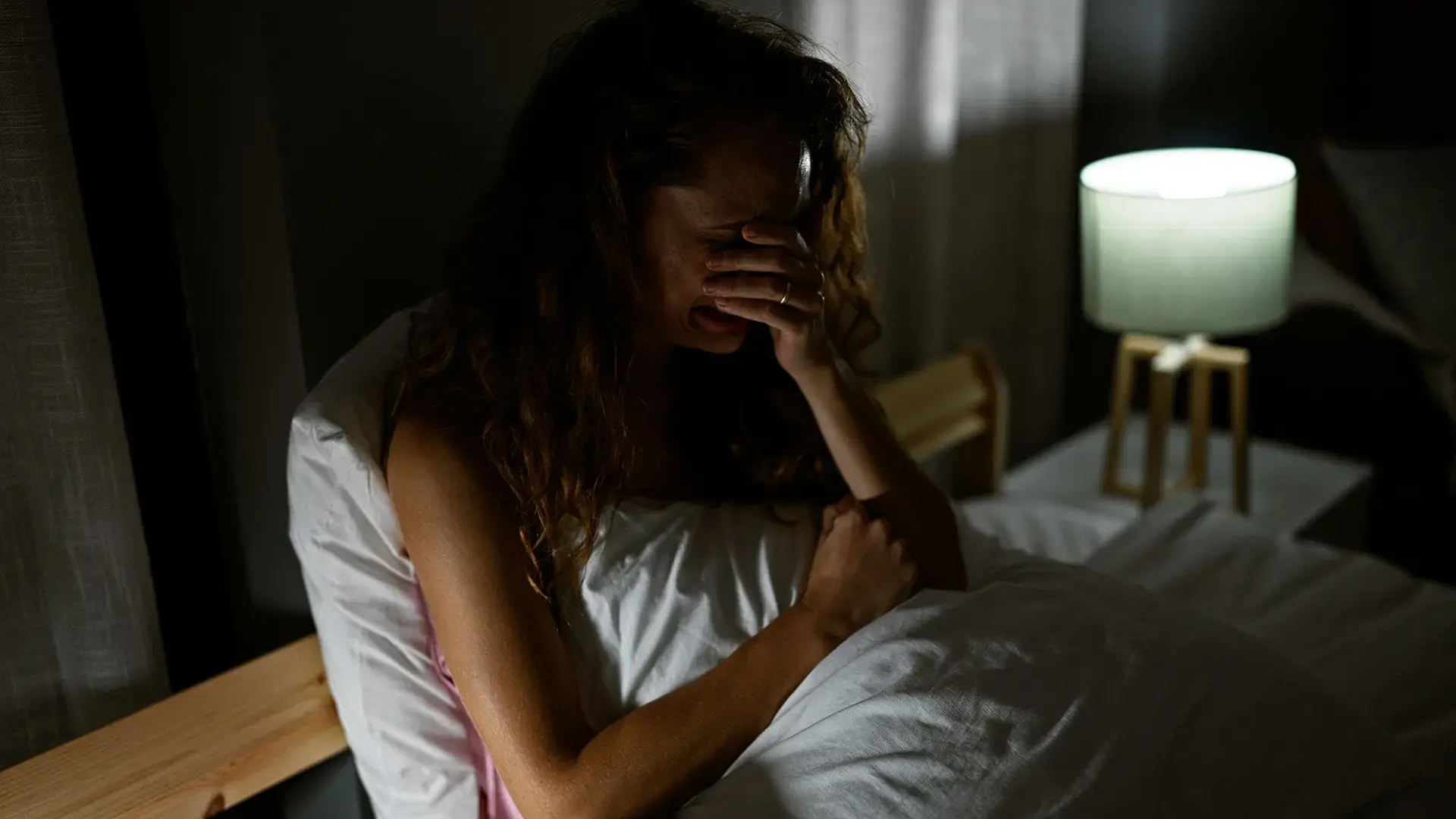As the day winds down and the world grows quiet, you may find yourself overwhelmed by a profound sense of sadness that wasn’t as noticeable during the day. You are not alone in this experience; many individuals struggling with depression find that their symptoms intensify during the nighttime hours. At Harmony Hills, we understand the unique weight of nighttime sadness and are here to offer guidance, coping strategies, and compassionate care to help you find peace after dark.
If you wonder “why do I get sad at night?”, Harmony Hills can help. Learn about depression at night, including its causes, symptoms, and treatment options.
Causes of Depression At Night
Nighttime can create a perfect storm for depressive thoughts and feelings to surface, as the transition from day to night introduces several psychological and physiological triggers. The absence of daytime distractions and the inherent quiet of the evening can significantly contribute to the cyclical nature of nighttime depression.
- A Lack of Distraction: During the day, work, social interactions, and routines can occupy your mind, but these distractions fade at night. This quietness leaves mental space for unresolved worries and negative thoughts to dominate your internal landscape.
- Feelings of Loneliness and Isolation: The natural quiet and darkness of night can amplify a sense of being alone. This perceived disconnect from others can make the world feel overwhelmingly large and empty, intensifying feelings of isolation.
- Mental and Physical Exhaustion: The cumulative fatigue from the day can deplete your emotional resilience by the evening. This exhaustion makes it more difficult to fend off negative thinking patterns and manage difficult emotions effectively.
- Disruptions to the Circadian Rhythm: Your body’s natural sleep-wake cycle, or circadian rhythm, directly influences mood-regulating hormones. When this rhythm is disrupted by poor sleep habits or irregular schedules, it can trigger or worsen depressive symptoms at night.
- Increased Rumination: The quiet and unstructured nature of nighttime provides an ideal environment for rumination—repetitively dwelling on sad or distressing thoughts. This pattern of overthinking can quickly intensify feelings of sadness and hopelessness.
It’s common for depression to worsen at night, but that doesn’t mean you have to manage it alone. Harmony Hills is here to help.
Symptoms of Depression
Depression is a complex condition that manifests through emotional, physical, and behavioral symptoms. Common emotional symptoms include:
- Persistent sadness
- Anxiety
- An “empty” mood
- Hopelessness
- Guilt
- Irritability
On the physical side, you may experience changes in:
- Sleep patterns
- Appetite
- Energy levels
Unexplained aches and pains often accompany these physical symptoms. Behaviorally, depression can lead to a loss of interest in hobbies, difficulty concentrating, and withdrawal from social activities you once enjoyed.
If you recognize any of these symptoms in yourself or a loved one, we encourage you to speak to a medical professional. Early intervention and depression treatment can help you manage your symptoms through therapy, medication, or both.
Coping Strategies for Nighttime Depression
Managing nighttime sadness involves creating a routine that promotes relaxation and a sense of safety. The following strategies can help you reclaim your evenings and foster a more peaceful state of mind.
Establish a Consistent Sleep Schedule
Going to bed and waking up at the same time every day, even on weekends, helps regulate your body’s internal clock. This consistency makes it easier to fall asleep and can improve the overall quality of your rest. A stable sleep rhythm is a foundational step in stabilizing your mood. Be consistent in your nighttime routine and recognize what can help you stay comfortable while you’re asleep, such as a fan or extra pillows, to ensure you can sleep soundly throughout the night.
Create a Wind-Down Routine
Engage in calming activities for 30-60 minutes before bed to signal to your brain that it is time to rest. This could include reading a physical book, taking a warm bath, or practicing gentle stretching. Avoiding screens and their stimulating blue light during this period is crucial for preparing your mind for sleep. Keeping a consistent wind-down routine can also help you build habits that signal your body to prepare for rest, helping you fall asleep faster.
Practice Mindfulness or Meditation
Mindfulness techniques can help you observe sad thoughts without judgment and let them pass. Guided meditations or deep-breathing exercises can calm your nervous system and reduce the physiological symptoms of anxiety. Making this a nightly practice can create a buffer between the stresses of the day and your time for rest. Consider creating a special environment for meditation, such as dimming lights or using a candle.
Limit Stimulants and Heavy Meals
Avoid consuming caffeine or nicotine in the late afternoon and evening, as they can interfere with your ability to fall asleep. Similarly, try to avoid large, heavy, or spicy meals close to bedtime, which can cause discomfort and disrupt sleep. Opt for a light snack if you are hungry, such as a small bowl of cereal or a banana. For this reason, you might consider eating dinner at an earlier time and limiting drinks with caffeine in them, like soda, black tea, or coffee, at least 4-6 hours before your bedtime.
Journal Your Thoughts
Writing down your worries or ruminations in a journal can help “get them out of your head” and onto the page. This practice can provide a sense of release and make your problems feel more manageable. You can also use your journal to list a few things you were grateful for each day, shifting your focus toward positivity. Keeping a consistent journaling schedule can help you practice mindfulness and improve your overall mental health.
Treatment Options for Depression At Night
When coping strategies are not enough, professional treatment can provide the tools and support needed for lasting recovery. At Harmony Hills, we offer a range of evidence-based and holistic therapies to address the root causes of your depression.
Cognitive-Behavioral Therapy (CBT)
Cognitive-Behavioral Therapy (CBT) helps you identify and reframe the negative thought patterns that contribute to your nighttime sadness. By challenging these cognitive distortions, you can develop a healthier and more balanced perspective. This therapy is particularly effective for breaking the cycle of rumination that often occurs at night.
Dialectical Behavior Therapy (DBT)
Dialectical Behavior Therapy (DBT) focuses on building skills in four key areas: mindfulness, distress tolerance, emotion regulation, and interpersonal effectiveness. These skills are invaluable for managing the intense emotional waves that can arise during the night. Learning to tolerate distress without resorting to negative behaviors is a key outcome of this treatment.
Eye Movement Desensitization and Reprocessing (EMDR)
Eye Movement Desensitization and Reprocessing (EMDR) is a powerful therapy used to process and resolve traumatic memories that may be underlying your depression. Through guided eye movements, the brain’s natural healing processes are stimulated, reducing the emotional charge of these memories. This can lead to a significant decrease in overall depressive symptoms, including those that surface at night.
Holistic Therapy
Our holistic therapies, such as yoga, art therapy, and music therapy, address your overall well-being, not just your symptoms. These modalities provide a creative and somatic outlet for expressing emotions that are difficult to articulate with words. Engaging the mind-body connection is essential for comprehensive healing from depression.
Group Therapy
Group therapy provides a safe and supportive environment to share experiences and learn from others who are facing similar challenges. It helps to reduce feelings of isolation and shame by normalizing your experiences. Giving and receiving feedback within the group also fosters the development of new social and coping skills.
Residential Treatment for Depression
For those who need intensive, structured support to break the cycle of depression, Harmony Hills offers residential mental health treatment. Our serene, residential setting in the heart of Florida’s nature provides a tranquil environment completely dedicated to your healing and recovery. By stepping away from daily stressors and triggers, you can fully focus on the therapeutic work necessary for lasting change.
- 24/7 Therapeutic Support: You will have constant access to a multidisciplinary team of psychiatrists, therapists, and nurses, ensuring your safety and providing immediate guidance.
- Structured and Safe Environment: Our program offers a daily schedule of therapeutic activities designed to build healthy routines and promote stability in a safe, trigger-free setting.
- Comprehensive Assessment and Personalized Care: We conduct a thorough assessment upon admission to create a highly individualized treatment plan that addresses your unique needs and co-occurring conditions.
- Peer Support and Community: Living alongside others on a similar recovery journey fosters a powerful sense of community, mutual understanding, and shared encouragement.
This immersive level of care is designed to provide the foundation for a sustainable recovery and a return to a fulfilling life.
Depression Treatment at Harmony Hills
At Harmony Hills, we believe that everyone deserves to find peace, both day and night. Our compassionate approach to depression treatment integrates evidence-based therapies with holistic practices to heal the mind, body, and spirit. Our residential mental health program offers 24/7 care, medical supervision, and a supportive, serene environment to heal. This complete immersion in recovery allows you to focus on your own mental health without worrying about outside responsibilities.
If nighttime sadness is overshadowing your life, we encourage you to contact us to learn more about our programs and take the first step toward reclaiming your peace.









